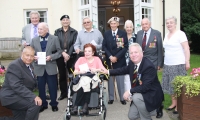Defence Expenditure Debate
This has been a very interesting debate on such an important day—the day that the national poppy appeal is launched, when we remember those who gave so much for us. What a perfect time for this debate to take place. It is my first debate as Minister for the Armed Forces in the Ministry of Defence.
I completely agree with the Committee in asking whether 2% is enough. Could we spend more? I am sure we could, but 2% is a NATO guideline. Would it not be great, as the hon. Member for Bridgend (Mrs Moon) indicated, if the other NATO countries also stepped up to the plate and spent 2% of their GDP on defence?
What great news it was today that our GDP has increased, even though scaremongers, including the BBC and others, said that the economy was in a dive after Brexit. It has gone in the opposite direction, which will mean there is more money to be spent. No Defence Minister would stand up and say, “No, we wouldn’t like to have more money,” and anybody who did would not be telling the truth. However, we have to live within our means and make sure that what we get is spent correctly, which is the crux of today’s debate.
Let us get Trident over and done with first. If we want to be a member of NATO, we have to be under a nuclear umbrella. If we do not want that, we do not stay in NATO. If we took the Scottish National party’s position, not only would we lose thousands of jobs on the Clyde, but we could not really be part of NATO. That debate has been had before. We debated the nuclear deterrent in the House, when the House—not the Conservative party or this Government—made the decision on the future nuclear deterrent by a huge majority. That was the message to the rest of the world and to NATO.
We have to spend the money correctly. Comparisons are really difficult. My right hon. Friend the Member for New Forest East, the Chair of the Committee, touched on that point in saying that trying to compare like with like is very difficult. National service was still in place when the hon. Member for Leeds North East (Fabian Hamilton) and my hon. Friend the Member for North Wiltshire (Mr Gray) were born, which has been alluded to. When I joined the Army in 1974, I was in the British Army of the Rhine in Germany with the 3rd Armoured Division. We had almost no fuel and almost no ammunition and we hardly ever left the military transport park. We just did not have the money. We sat there knowing full well that we were a deterrent. The boys and girls who were serving at that time were very brave—all the armed forces were brave—but we knew that the money was not being spent correctly. As a young soldier, I could see it then and we have seen it through various Governments that have been in power.
How do we spend the money as best as possible? We get the right kit to deal with the threats, but the threat changes. Most of us thought the cold war was over. We thought we could look at the threats from other parts of the world and apply our defence accordingly. In the past couple of months we have had to look back to the old foe. We saw their fleet sailing through the English channel, probably as a sign of what they could do. We saw black smoke coming out of the top of the aircraft carrier—she could not have gone a knot faster if she had tried because she is so old and decrepit—but she represents a threat. Could they have gone round the north, as they have done before? In fact, the weather was very bad off the west coast at the time, but probably they were sending a message. Our boys and girls in our armed forces shadowed her man for man as she came through. I know that because I was on a frigate in the channel while the aircraft carrier was coming through.
We have to be careful with these defence reports. We are genuinely trying to do the best for our armed forces and make sure they have the right equipment. We must show we are behind them and not undermining them. It is a very thin line.
I have responsibilities as the Ops Minister. Everybody thinks we are home from Afghanistan and Iraq, but we have ops in nearly 39 countries where our armed forces are serving us today. I do not think we have paid enough tribute to those boys and girls—our servicemen and women who are out there on our behalf—during this debate. I know it was touched on in some Members’ speeches, but mostly it was not, and that is a real disappointment because the forces pick up on what we say in this House and see where their support is.
Are we hollowed out? I do not think so; I would not be able to do this job if I thought that was the case. We will continue to fight the Treasury to make sure we have as much as we possibly can. It is enormously difficult to compare what happened in 1956 with what happened in 1974 when I joined the Army. The package we offer our armed forces is absolutely important. The issue is not just about recruitment, but about retention, which I will come to in a moment.
It has been asked whether the international aid budget, which is 0.7% of GDP, should be linked to the MOD budget. Some of us have been in this place a long time. Although I was not elected such a long time ago, I remember a huge argument going on between DFID and Defence when Clare Short was the excellent DFID Secretary of State over helicopters during the flooding in Bangladesh—I may be wrong, but I think it was in Bangladesh. A massive delay took place while they argued about money. Is that the sort of situation that we want to be in today? If our Navy or our armed forces are operating in a humanitarian area, it is right that we help, but should that come from my budget or from DFID’s? We need to work much more closely together.
I will not be able to answer all the questions in the time I have been given, but the crux of the matter is that we are all, no matter what party we are from, pushing for the same thing. We want to respect our armed forces and give them the kit and equipment they need. We will disagree on certain aspects. We disagreed on Trident, which was debated in the House. We will continue the debate, but the House has made a decision and we are pressing ahead. I am really pleased that Her Majesty’s Opposition has committed to 2% of GDP on defence. That is the first time we have heard that. We have had a commitment for this Parliament going forward and I am really pleased that the Labour party has bitten the bullet, for want of a better description, and committed to doing that. I hope the hon. Member for Leeds North East (Fabian Hamilton) has not got into trouble over it, but I will write to him to confirm the commitment when this debate is over. It is a very important message from this House as we go forward.
I felt the report was helpful. As it says, we have not broken any rules. Along with my fellow Ministers, I will spend the money in the best way we possibly can to make sure we continue to have the best armed forces in the world and that they have the kit and equipment they require.



